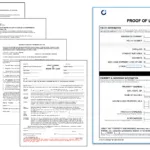Filing a homeowners or property insurance claim can be frustrating. Jumping into a claims process and dealing with insurance companies, adjusters, contractors, or attorneys immediately after your property is damaged can be a headache. Having your property damaged is already frustrating, and making an insurance claim and following it through to payment can be tedious. It’s not something you do every day, and it’s subject to nuanced and hard to understand state laws and regulations, as well as complicated policy terms. The good news, through, is that Michigan has protections for policyholders built into the insurance law, and the insurance regulations provide strict deadlines and requirements for the investigation and payment of property insurance claims. If policyholders are aware of these deadlines and rules, and are proactive with respect to their claims, they should have a smooth, fast, efficient, and fair insurance claim process.
These resources are built to help policyholders — and all the stakeholders who work with them, like adjusters, attorneys, contractors, and consultants. These resources will help you file your claim correctly, document your losses thoroughly, and know when and how to followup through the claim process. And, if necessary, how and when to escalate and resolve the claim.
Filing Deadline
Reasonable time
The deadline for informing the insurer of a claim is set by the policy itself. It is always best practice to inform an insurance company of the losses sustained and that a claim is being made as soon as it is reasonably possible to do so after the damage is incurred.
Initial Response Time
30 days
Tennessee requires insurance companies to acknowledge property insurance claims (and to provide necessary claim forms, instructions and reasonable assistance) within 30 calendar days after receiving notification of claim. Note, however, that if a specific request is made for necessary forms, the forms must be provided within 15 days from the request.
Claim Decision Time
60 days
Tennessee insurance law requires that insurers must notify a claimant of the acceptance or denial of his or her claim within 60 days after receipt by the insurer of properly executed proofs of loss; and must inform the claimant of the results of any investigation within 30 days of the investigation being completed.
Lawsuit Deadline
Varies
Tennessee has different time periods in which suit must be filed: 6 years for breach of the insurance contract; 3 years for injury to property; and 1 year for bad faith. Note that in any event the time period for filing suit under the policy can be limited by the policy itself, and can be as short as 6 months.
State Department
Tennessee Department of Insurance
Tennessee Department of Commerce and Insurance
Davy Crockett Tower
500 James Robertson Pkwy
Nashville, TN 37243
(615) 741-2241
Tennessee Department of Commerce and Insurance website
File your Claim Now with ClaimSpot
ClaimSpot guides you through a quick, secure, and effortless filing experience.
It’s free. Let ClaimSpot Make Your Claim Fast & Easy.
Tennessee Insurance Claim Guide
Filing: Tennessee Insurance Claim FAQs
All insurance claims start by informing your insurance company of the loss. You want to do this as soon as possible. There are many ways to notify the insurance company. It’s most important that you keep a record of notifying them. Here are frequently asked questions about how to best “file your claim” with the insurance company in Tennessee and the state regulations that will help (or hurt) you!
In order to initiate a claim under a property insurance policy in Tennessee, the policyholder must inform their insurance carrier of the loss (either directly or through their agent), that they are making a claim, and provide a few details – there is no required form or specific statement required.
In many cases, an insurance company will call this communication a first notice of loss, or FNOL. In Tennessee, insurance laws call this communication “notification of claim.”
Most insurance companies provide multiple ways to contact them after a loss to begin the claims process, these usually include:
a. Phone call (a number is usually provided on the insurance company’s website);
b. Online portal – many insurance companies have an online form to notify the claims department of a loss, this may even be through a mobile app;
c. Your agent – many insurance companies even have a different section of their website or phone number for an agent to inform them of a policy-holder’s loss;
d. Online software as a virtual assistant.
While it is easy and quick to start a claim, claimants need to continue to follow-up and provide more information. In many cases, the insurer will require more information and supporting documentation, including specific forms, to actually process and adjust the claim. In Tennessee, these specific and necessary forms should be provided to the claimant by the insurance company within 30 days after receipt of claim, or within 15 days of when the forms are specifically requested.
1. Promptly inform your insurance carrier of the loss (see above);
2. As soon as possible begin to mitigate the damage – protect the property and secure it against further damage as soon as it is safe and possible to do so.
3. Cooperate with your insurance company and communicate with them (and keep copies of all correspondence).
4. Make your property available for inspection as soon as it is safe and possible to do so.
5. Prepare supporting documents for your claim including:
– Inventory list;
– Description of damages;
– Photographs and/or videos of the damage;
– Receipts; etc.
Tennessee insurance law does not set forth any specific deadline for making a property insurance claim. This means that the deadline for informing the insurer of a claim is set by the policy itself. It is important to be familiar with the insurance policy so that deadlines are not missed. Since Tennessee does not have a “standard fire policy” like 29 other states, there is no specific statutory guidance regarding when the claim must be made after incurring a loss.
It is always best practice, however, to inform an insurance company of the losses sustained and that a claim is being made as soon as it is reasonably possible to do so after the damage is incurred and a determination that a claim will be filed is made. While it is never a good idea to delay in providing the insurance company with information once it has been determined that a claim will be filed, the actual meaning of “immediate” or “prompt” or “reasonable” with respect to making a claim depends on the circumstances – if a home is completely destroyed by a storm and the phones, internet, and power are off, it may take a little longer to make the claim.
Be sure to check the language of the insurance policy to determine the notification or reporting deadlines. But, in any event, remember that best practice is to provide notice of the loss and claim to the insurer as soon as possible.
Followup: Document Your Tennessee Insurance Claim FAQs
Notifying the insurance company about a loss is just the first step. The most important work comes next: documenting your loss and following up with the carrier. Tennessee has enacted many regulations to guarantee that the insurance company acts moves promptly and fairly to investigate and pay your claim…but you need to understand these regulations and know the appropriate timeframes. That means communicating with the insurance company early and often and putting them on the clock. These FAQs will let you know the applicable standards.
Documentation Deadline: Tennessee does not set a specific deadline to provide support for a property insurance claim by statute, but instead allows this timeline to be set by the policy itself. Generally, many policies of property insurance require that proof of loss documentation be provided within 60 days of when the loss occurred, but this period is not universal, and can be shorter (or longer) depending on the policy itself.
In any event, however, the deadline for submitting a proof of loss may usually be extended by agreement between the parties if circumstances make it difficult or impossible for the policyholder to comply with the deadline as set forth by the policy. Proof of loss requirements usually need substantial information in order to be properly completed, so getting started quickly is crucial.
Note, however, that no matter the actual deadline for providing supporting documentation, it is always best practice to provide a proof of loss document and support of the claim as soon as possible (while noting that the document only presents the knowledge at the time and may be amended or updated). In Tennessee, some deadlines for the insurance companies are based upon receipt of sufficient proof of loss documentation. This means that getting a properly completed proof of loss to the insurance company quickly is a good way to get the claim process moving along, and to get your payment quicker.
Tennessee has adopted laws governing insurance providers, and specifically unfair claims settlement practices, to protect policyholders and to provide a streamlined timeline for claims to be handled. These requirements provide deadlines for the acknowledgment, processing, investigation, and payment of claims.
Deadlines for Acknowledgment: Tennessee requires insurance companies to acknowledge property insurance claims (and to provide necessary claim forms, instructions and reasonable assistance) within 30 calendar days after receiving notification of claim. An “acknowledgement” of the claim in North Carolina is one of the following:
(1) Making Payment.
(2) Sending the claimant written acknowledgement, with a copy saved in the claim file.
(3) Giving the claimant verbal acknowledgement, with a notation of such saved in the claim file and dated.
(4) Providing all necessary claim forms, instructions, and reasonable assistance for the claimant to comply with policy requirements.
Note, however, that Tennessee’s “Unfair Claims Practice” statute provides that it is an unfair trade practice if an insurer fails to provide an insured “forms necessary to present claims within fifteen (15) calendar days of such a request.” This is obviously a shorter time period than the 30-day period above, so it is best practice to make a specific request for all necessary or required forms immediately when providing a notification of loss.
Deadlines for Investigation: Tennessee doesn’t really provide a specific breakdown of the time to begin or conclude an investigation of the claim. However, in Tennessee, an insurer is required to notify the claimant within 60 days from the insurer’s receipt of proof of loss if more time is required to complete the investigation (otherwise, the insurer must accept or deny the claim within that 60-day period). If more time is needed and the investigation remains incomplete, “the insurer shall, sixty (60) days from the initial notification and every sixty (60) days thereafter”, send the claimant a letter explaining why more time is needed.
Additionally, Tennessee law does require that insurance companies “adopt and implement reasonable standards for the prompt investigation and settlement of claims” and insurers are required to notify the claimant of the findings of any investigation within 30 days of the investigation being completed.
Tennessee requires insurers to acknowledge communications with respect to claims arising under its policies by the policyholder “with reasonable promptness” but in no event later than 30 days after any communication that reasonably suggests a response is expected is received from a claimant.
Resolving: Get Paid & Protect Your Rights On Tennessee Insurance Claim FAQs
Ultimately, the insurance claim must be approved and paid (or, unfortunately, denied). Getting to this step and getting the money has a lot of logistics…and that is if everything goes well. If all or any portion of the claim is debated (which is really common) then you need to escalate it. In either event, Tennessee has regulations governing these timelines to guide the way. These FAQs show what is supposed to happen.
Deadline for Acceptance/Denial: Tennessee insurance law requires that insurers must notify a claimant of the acceptance or denial of his or her claim within 60 days after receipt by the insurer of properly executed proofs of loss. In the event the claim is denied, the denial must be in writing, and must refer to a specific policy provision giving reason for the denial.
If more time is needed, the insurer must notify the claimant within the original 60-day period from receipt of proof of loss, and give reasons why additional time is required. Further, the insurer must continue to provide the claimant with an update of the status of the investigation every 60 days thereafter while the investigation remains ongoing, until acceptance or denial of the claim. Additionally, the insurer is obligated to notify the claimant of the findings of any investigation within 30 days of the investigation being completed.
Deadline for Payment: Tennessee requires insurance companies to make payment under the policy within 30 days of when liability under the policy is affirmed. And, more generally, must attempt in good faith to effectuate prompt, fair, and equitable settlement of claims. Specifically, if an insurance company fails to pay the loss within 60 days after demand for payment has been made, the insurer is subject to bad faith penalties, and the insured is entitled to file a lawsuit to recover same.
If an insurance company is determined to be in violation of the unfair claims settlement practices requirements, the insurer may be subject to penalties. While the specific unfair trade practices requirements do not create a private right of action (the ability for a policyholder to sue the insurance company directly for breach) the policyholder can complain to the state insurance department and the insurer can be penalized. Further, knowing the requirements and making sure the insurance company is aware of them may help in any later litigation that may be required pursuant to another cause of action (breach of contract, bad faith, etc.).
Additionally, insurers have a requirement to act in good faith in investigating and settling the claim. Tennessee’’s “bad faith” insurance statutes provide that the insurance company can be subject to penalties of up to an additional 25% of the liability under the policy. In order to recover these penalties, the insured must show:
The insurer refused to pay within 60 days of demand for payment;
The refusal to pay the loss was not in good faith; and
The failure to pay inflicted additional expense, loss, or injury on the insured (including requiring attorneys’ fees).
If a claimant is successful, the claimant may be awarded not only the amounts due under the policy, but also attorneys’ fees and punitive damages against the insurer.
Deadlines to File Suit: The deadlines to file suit against a property insurer in Tennessee vary depending on several factors.
Overall, the time period in which a suit must be filed on a breach of contract action in Tennessee is 6 years (insurance policies are contracts). However, the time limit for filing suit for injury to property in Tennessee is 3 years. In order to determine which time period applies, the court will look to the actual subject matter of the controversy, not whether the action was styled as one for breach of contract or for tort.
Beyond that, however, there are other shorter time periods that may apply. The deadline to file an action for bad faith must be initiated within 1 year, because Tennessee has a one-year statute of limitations period applicable to “actions for statutory penalties.”
Finally, the policy itself may limit the time to file suit pursuant to the policy, as well. While the limitation must be reasonable, Tennessee courts have held that a time period as short as 6 months is reasonable and enforceable against the policyholder.












